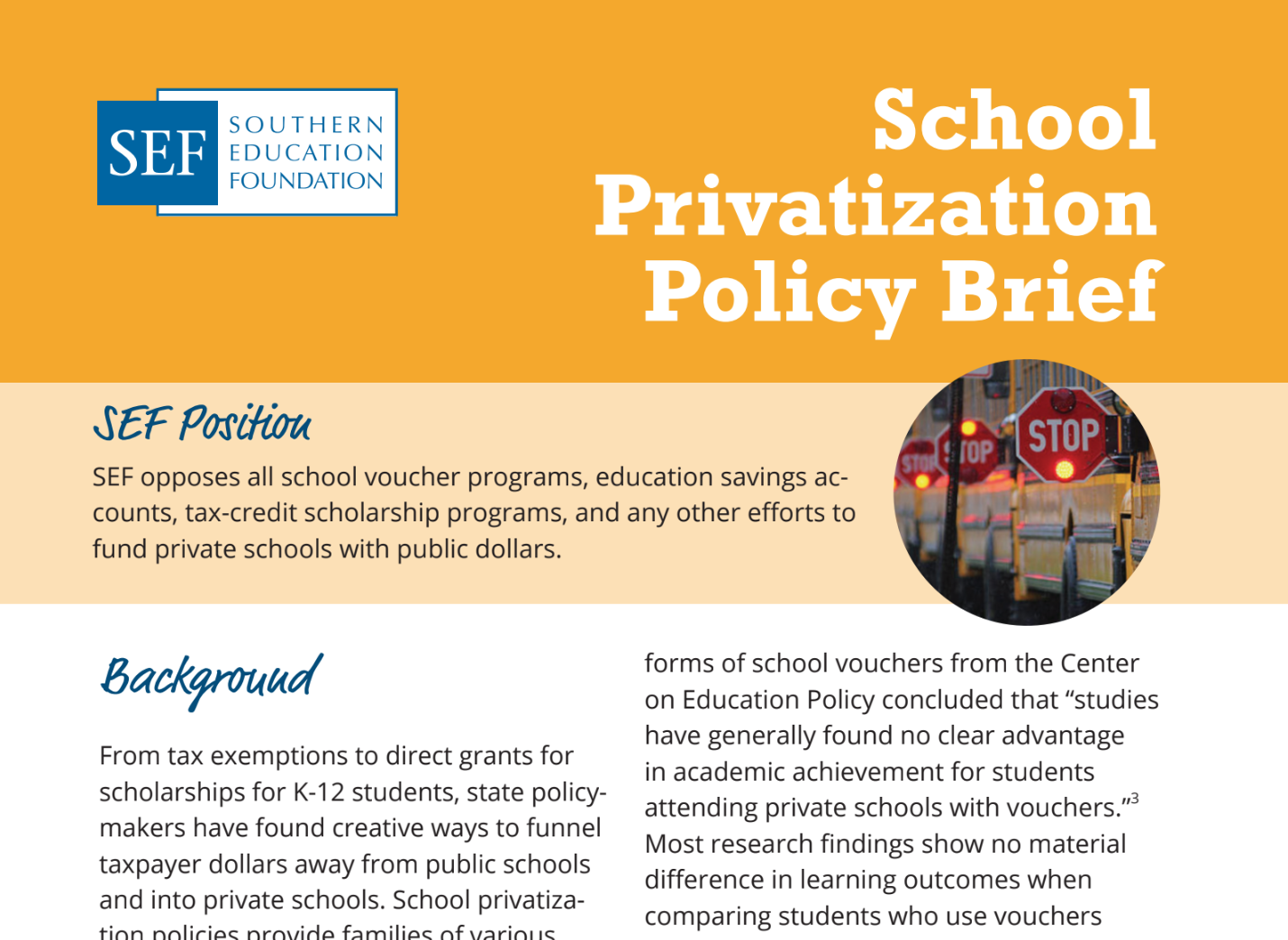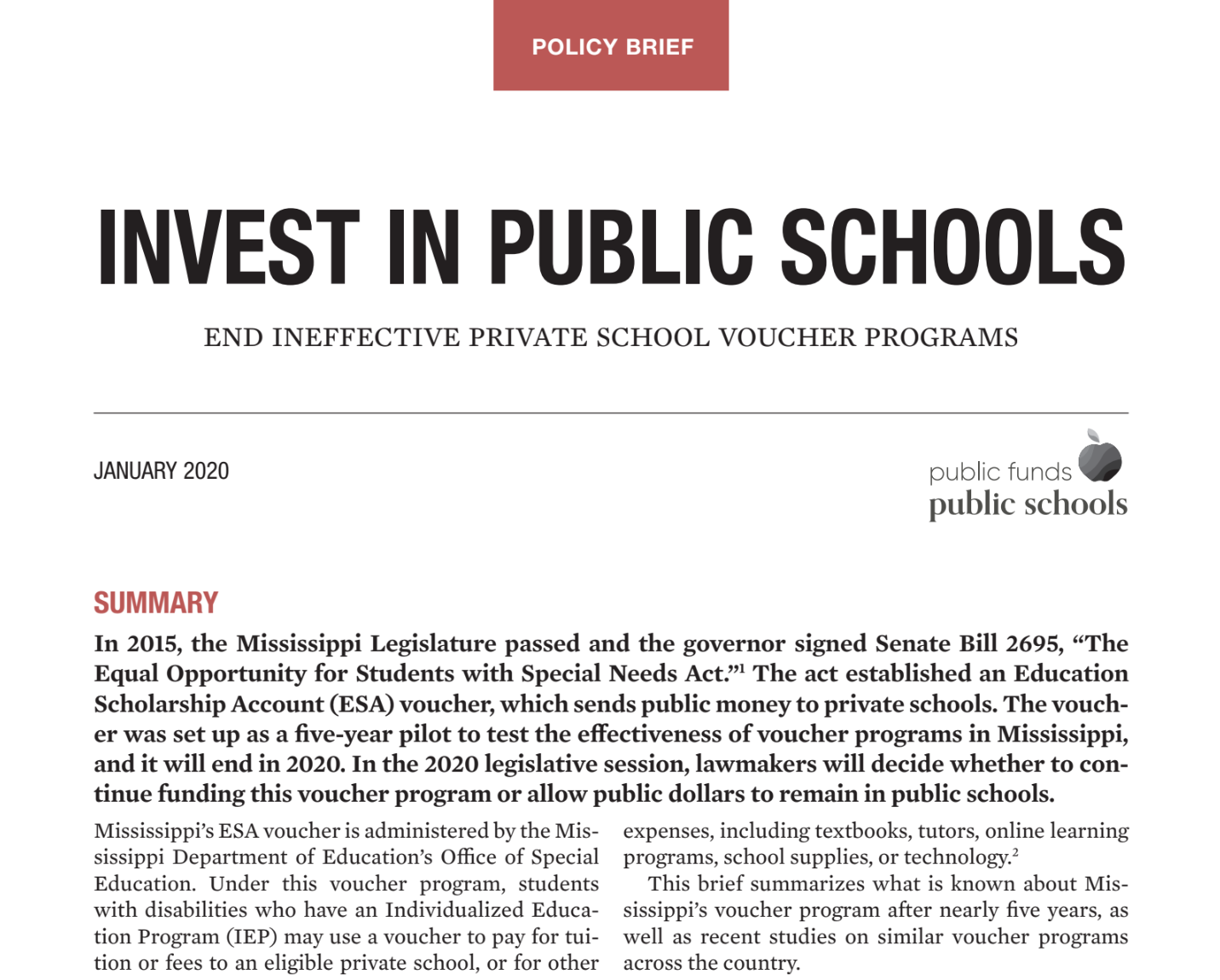ALL RESOURCES
FILTER BY TAG
Select a tag
- Academic performance
- Accessibility
- Accountability
- Advocacy
- Advocates
- Article
- Bill analysis
- Bill tracker
- Billionaires
- Blog post
- Civil rights
- Coalition building
- Community Schools
- Cost impact analysis
- Dark Money
- Data
- Disability
- Discrimination
- Drain funds from public education
- Education Savings Account (ESA)
- English language learners
- Fact sheet
- Fraud Waste and Abuse
- Graphic
- History
- Indigenous and Native Education
- Integration
- LGBTQ+
- Legislation
- Letter
- Litigation
- Messaging or talking points
- Model legislation
- National Voucher
- News
- Parents
- Personal narrative
- Podcast
- Policy brief
- Policymakers
- Radio
- Referendum
- Religion
- Report
- Rural communities
- Segregation
- Separation of church and state
- Slide deck
- Slides
- State Constitutional Right to Education
FILTER BY AUTHOR
Select an author
- Aaron Sanderford
- Alec MacGillis
- Allen Pratt
- Associated Press
- Bob Peterson
- Bruce Schreiner
- Catherine Caruso
- David Montgomery
- David Pepper
- Eli Hager
- Emily Walkenhorst
- Ethan Dewitt
- Geoff Mulvihill
- Hilary Wething
- Howard Fischer
- Jason Bailey
- Jessica Corbett
- Jim Collier
- Joe Dana
- Joshua Cowen
- Juan Perez Jr.
- Kiera Butler
- Laura Pappano
- Liam Amick
- Maurice Cunnningham
- Nora De La Cour
- Paige Masten
- Patrick Darrington
- Paul Hammel
- Phil Williams
- Rob Boston
- Robert Huber
- Rowan Moore Geretsy
- Sasha Pudelski

Protect Public Schools: An Advocacy Toolkit to Fight School Voucher Programs
School voucher programs and their many iterations (education savings accounts, tax credits, etc.) drain funds from public schools while disproportionately harming Black and Brown students from low-income backgrounds and students with disabilities. This toolkit provides the resources and information communities need to launch effective advocacy campaigns against school voucher programs in their state.

Keep Public Funds in Texas Public Schools
Private school voucher bills are being debated in the Texas Legislature again this year. An ever-increasing body of research shows that vouchers negatively affect student achievement, harm rural communities, exacerbate school segregation, promote discrimination, and undermine public school systems that welcome and serve all students. Texas public schools, which educate the vast majority of children, including the largest number of rural students in the country, remain starkly underfunded. Texas lawmakers must continue rejecting proposals for harmful voucher programs and instead use state resources to invest in public schools.

Let the Illinois “Invest in Kids” Private School Voucher Law Sunset
Illinois’ “Invest in Kids” tax credit voucher program is set to sunset after the 2023-2024 school year. This unpopular pilot program should lapse as intended in the law. Illinois should reject any attempt to extend the program or make it permanent, as well as any proposal to establish additional voucher programs. Instead, the state must invest in its underfunded public schools, which, unlike private schools, welcome and serve all students.

Future Costs of Idaho SB 1038’s Universal ESA Projected to Rise Sharply
Senate Bill 1038, which is before the Idaho Senate, would create a universal private education program. According to the bill’s fiscal note, in its first year (FY2024) Freedom in Education Savings Accounts (ESA’s) would cost the state about $45 million in Fiscal Year 2024 by serving about 6,600 Idaho students and providing administrative funds for the new program.

Universal Vouchers Will Cost Florida Billions in Education Dollars
On March 27, 2023, Gov. Ron DeSantis signed CS/CS/CS/CS/HB 1 into law.1 This bill makes vouchers, known as Florida Empowerment Scholarships and Florida Tax Credit (FTC) Scholarships, available to all students in the state who are eligible for kindergarten through grade 12, regardless of family income. Vouchers already cost $1.4 billion — dollars that are redirected from public education to private schools.

Estimating FL’s SB 202 Universal Voucher Cost in First Year
The SB 202 proposed legislation in Florida would further expand the already substantial voucher program, pulling an estimated $4 billion in state aid from public school districts to private education in 2023-24 though Florida Empowerment Scholarships with the cost increasing annually. Estimates of the cost of this program at the district and state level were made based on a variety of assumptions described below. The Florida Tax Credit Scholarship program, providing $568 million in vouchers in 2021-22, is also poised for expansion, but estimates for that program are not included here.

The State of Education Savings Account Programs in the United States
Education Savings Accounts are a new form of private school choice and are arguably the most strongly promoted approach by voucher advocates. This policy brief examines the emerging policy, considering how it mirrors and differs from conventional voucher ap- proaches and examining the legal issues that it raises.

PA EITC and OSTC School Voucher Programs
The Educational Improvement Tax Credit (EITC) and Opportunity Scholarship Tax Credit (OSTC) voucher programs work by reducing taxes paid by businesses to the state when they contribute to scholarship organizations that provide vouchers for children to attend a private or religious school. The programs are administered by the Pennsylvania Department of Community and Economic Development (DCED).

School Privatization Policy Brief
The Southern Education Foundation developed this policy brief SEF in opposition to all school voucher programs, education savings accounts, tax credit scholarship programs, and any other efforts to fund private schools with public dollars. In the seventeen states SEF serves, twelve states operate school privatization programs that provide either school vouchers, tax-credit scholarships, or education savings accounts, resulting in 276,000 participating students and amounting to $1.6 billion in state funding or tax benefits to fund private schools or pay for private education services.

Invest in Public Schools
This policy brief focuses on Mississippi’s ESA voucher program. In 2015, the Mississippi Legislature passed and the governor signed Senate Bill 2695, “The Equal Opportunity for Students with Special Needs Act.”1 The act established an Education Scholarship Account (ESA) voucher, which sends public money to private schools. The voucher was set up as a five-year pilot to test the effectiveness of voucher programs in Mississippi, and it will end in 2020. In the 2020 legislative session, lawmakers will decide whether to continue funding this voucher program or allow public dollars to remain in public schools.
